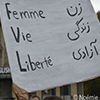Despite four coups d’état, the deportation of two French journalists, and the suspension of several French media in Burkina Faso, one French correspondent has decided to stay to tell the story from within. Her name is Fanny Noaro-Kabré.
Fanny Noaro-Kabré became the only French correspondent in Burkina, the “Land of Honest Men,” after the deportation of two French journalists in April 2023.
The 39-year-old journalist, who “fell in love with West Africa” after her experience as a radio special correspondent in the Plein Sud RFI radio program (2006-2010), is on her way to her 10th year living in Burkina Faso.
“I had fallen in love with Mali. I had been there several times and even learned Bambara in Paris. But there were already too many foreign journalists. Hence, I chose to live in a Francophone country that resembled Mali, but with fewer freelancers,” said Fanny.
From a special correspondent to a foreign journalist
The French journalist moved to Burkina Faso in December 2014 and published her first articles in February 2015. Today, she works for both TV5 Monde and Radio Télévision Suisse, reporting stories “from the inside to not let sensationalism rise” in French and foreign media.
As a special correspondent, I felt like I was reporting things superficially because I didn’t live there. I wanted to settle in for at least a year,” said Fanny.
Pour la #CAN2023 les correspondants de @JTAtv5monde donnent de leur personne ! Allez les Étalons ! pic.twitter.com/O28f7uxRld
— Fanny Noaro-Kabré (@FannyNoaro) January 10, 2024
The journey of a foreign journalist
When Fanny started, she was constantly asked “What the hell are you going to do in Burkina?” But she felt the insurrection was rising. The best moments she remembers from the last 10 years are when she was able to “enter circles that were once more closed” and talk with people who entrusted her “with a little piece of their life.”
At the beginning of her career, Fanny’s “naivety” and “little experience related to security” enabled her, to some extent, to cover the first putsch attempt of September 2015 and the first attacks in January 2016. She even confused tracer bullets with red fireworks passing by in the sky. While recounting these anecdotes with hindsight, Fanny laughed about these experiences that made her “mature” as a foreign journalist.

One of the most striking instances of these attacks was when gunmen stormed the Splendid Hotel and the Cappuccino restaurant in the heart of Ouagadougou, the capital of Burkina Faso, on 15 January 2016. The attackers, affiliated with Al-Qaeda in the Islamic Maghreb (AQIM), killed at least 30 people from various nationalities and injured many others.
Precariousness as a freelance
The French journalist has witnessed and faced many precariousness issues. On October 14, 2023, Fanny signed the Mediapart column, denouncing the deterioration of the working conditions of foreign journalists.
« Although France is supposed to help with salary, unemployment, and healthcare insurance, it always doesn’t. Whether you have malaria or dengue, you must pray not to have a broken arm or leg,” she said. Fanny revealed that foreign correspondents who settle in the country don’t receive unemployment insurance and must pay “€2,000 per year” for their health insurance.
Fighting for the freedom of the press
Since the coup d’état by Captain Ibrahim Traoré on September 30, 2022, there has been a deterioration of security and press freedom in Burkina Faso. The intimidation of independent, foreign, and local press has increased. Burkinabè media, such as L’Evénement, Le Reporter, and Omega FM, have experienced popular repression and have been suspended numerous times by the new authorities.
On April 1st, 2023, French correspondents Sophie Douce from Le Monde and Agnès Faivre from Libération were deported from Burkina Faso. Despite her repatriation, Agnès still thinks about Burkina “every day.”
I do not regret investigating the subject which led to my expulsion. It was carefully considered, in agreement with my managers. At the time, I coldly complied to the expulsion, as I had 24 hours to leave the country. But I was very sad to leave Burkina so quickly, a country I am still very attached to,” said Agnès Faivre.
Burkina Faso's military rulers expelled two French journalists working for newspapers Le Monde and Liberation, Agnès Faivre and Sophie Douce, their papers saying it was done to shut off media freedom #Journalists #MediaFreedom #France #BurkinaFaso pic.twitter.com/F0wKzFctjB
— BlueprintGreece (@BlueprintGreece) April 3, 2023
“Every story is worth telling.”
As the only French correspondent in Burkina Faso, Fanny believes her responsibility is to prevent a “media blackout.” According to her, the lack of international correspondents in the country may lead to media hype on war, political issues, coups, and putsches and less coverage on the resilience of the Burkinabè people or other subjects.
I swear to you that if you manage to set foot in Ouagadougou, you will not believe your eyes when seeing that everything is quiet and chill here, people are adorable, festivals are still being organized, and there are economic and social reforms. All that is worth talking about,” said Fanny.
She further explained that permanent correspondents like her “manage to stop the sensationalism” and “feel useful in being able to put things in context.”
Bridging the gap as a Franco-Burkinabè
Married to a Burkinabè man and mother of a Franco-Burkinabe little boy, Fanny feels “attached” to the “Land of Honest Man” and considers herself “lucky” for having the Burkinabè nationality.

Fanny emphasized the importance of archives in Burkina to tell accurate stories but recalls that Burkinabè records are not always well-preserved. “I hope that, in a few years, when Burkina comes out of this, I will be able to show my son the archives and say: ‘There you go! Your country got through very dark times, but this is how it managed to rebuild itself after the war’,” said Fanny.
When asked by her foreign coworkers about certain subjects in Burkina Faso, Fanny has always tried to give a Burkinabè perspective. Her dual nationality and experience allowed her to bridge the gap between France and Burkina.
Despite the escalating violence and political instability in Burkina Faso, which, according to RSF, have significantly compromised journalists’ safety and hindered access to information, Fanny Noaro-Kabré remains resolute in her decision to stay.
Burkina is a magnificent country with incredibly resilient and touching people. You can pull me by the shirt, attempting to persuade me to leave, but I am determined to hold on,” said Fanny.
Cintia Nabi Cabral interviewed Fanny Noaro- Kabré on December 15th, 2023, and Agnès Faivre on December 6th, 2023.







